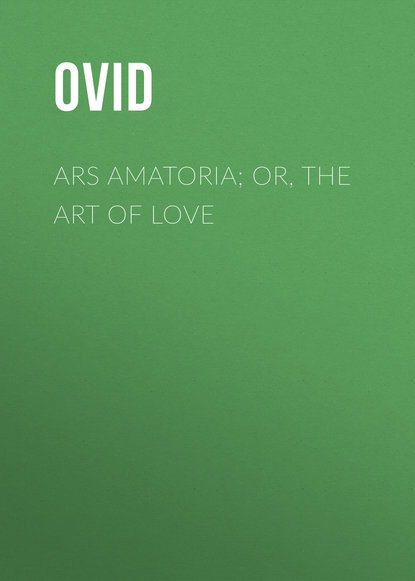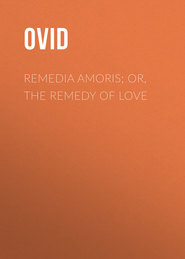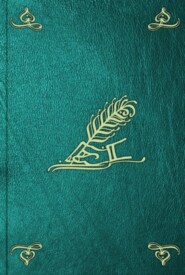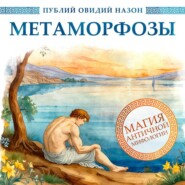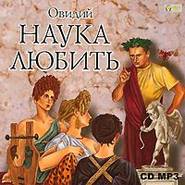По всем вопросам обращайтесь на: info@litportal.ru
(©) 2003-2024.
✖
Ars Amatoria; or, The Art Of Love
Настройки чтения
Размер шрифта
Высота строк
Поля
909 (return (#x2_x_2_i5))
[ And Calymne.—Ver. 81. These peaces are mentioned in the corresponding passages in the Metamorphoses, Book viii. 1. 222.]
910 (return (#x2_x_2_i5))
[ Astypalæa..—Ver. 82. This was an isle in the group of the Sporades, between Crete and the Cyclades. It contained but one city, and was long and narrow, and of rugged appearance.]
911 (return (#x2_x_2_i8))
[ The young horse.—Ver. 100. See the Amoves. Book i. El. viii 1. 8, and the Note.]
912 (return (#x2_x_2_i8))
[ The Marsian spells.—Ver. 102. The 'naenia' was a mournful dirge or chaunt uttered by the sorcerer in his incantations. On the Marsi, see the Sixth Book of the Fasti, 1. 142, and the Note to the passage.]
913 (return (#x2_x_2_i8))
[ Causing paleness.—Ver. 105. Philtres were noxious potions, made of venomous or stimulating ingredients, prescribed as a means of gaining the affections of the person to whom they were administered.]
914 (return (#x2_x_2_i8))
[ Nireus.—Ver. 109. See the Pontic Epistles, Book iv. Ep. xiii. 1. 16, and the Note to the passage.]
915 (return (#x2_x_2_i8))
[ Charming Hylas.—Ver. 110. See the Tristia, Book ii. 1.]
916 (return (#x2_x_2_i9))
[ Ocean Goddesses.—Ver. 124. Calypso was really the only sea Goddess that was enamoured of Ulysses. Circe was not a sea Goddess.]
917 (return (#x2_x_2_i10))
[ Blood of Dolon.'—Ver. 135. See the Metamorphoses, Book xiii. line 244.]
918 (return (#x2_x_2_i10))
[ Hjemontan horses—Ver. 136. The steeds of Achilles.]
919 (return (#x2_x_2_i11))
[ The Chaonian bird.—Ver. 150. Chaonia was a district of Epirus, said to have been so called from Chaon, a Trojan. Dodona was in Epirus, and in its forests were said to be doves that had the gift of prophecy. See the Translation of the Metamorphoses pp. 467-8.]
920 (return (#x2_x_2_i12))
[ Resort to law.—Ver. 151. He means to say 'let man and wife be always thinking about resorting to law to procure a divorce.']
921 (return (#x2_x_2_i13))
[ 1 gave verses.—Ver. 166. He intends a pun here. 'Verba dare' is 'to deceive,' but literally it means 'to give words.' See the Amores, book i. El. viii. 1. 57.]
922 (return (#x2_x_2_i15))
[ Atalanta of Nonacris.—Ver. 185. See the Amores, Book iii. El. ii. 29, and the Note.]
923 (return (#x2_x_2_i15))
[ Bow of Hylceus.—Ver. 191. Hylæus and Rhæcus were Centaurs, who were pierced by Atalanta with her arrows, for making an attempt on her chastity. He alludes to the bow of Cupid in the next line.]
924 (return (#x2_x_2_i16))
[ The ivory cubes.'—Ver. 203. He alludes to throws of the 'tali' and 'tessera,' which were different kinds of dice. See the Note to 1. Footnote 471: of the Second Book of the Tristia. In this line he seems to mean the 'tessera,' which were similar to our dice, while the 'tali,' which he next mentions, had only four flat surfaces, being made in imitation of the knuckle-bones of animals, and having two sides uneven and rounded. The dice were thrown on a table, made for the purpose, with an elevated rim. Some throws, like our doublets, are supposed to have counted for more than the number turned up. The most fortunate throw was called 'Venus.' or 'Venereus jactus'; it is thought to have consisted of a combination, making fourteen, the dice presenting different numbers. Games with dice were only sanctioned by law as a pastime during meals.]
925 (return (#x2_x_2_i16))
[ Make bad moves.—Ver. 204. 'Dare jacta' means 'to move the throws,' in allusion to the game of 'duodecim scripta,' or 'twelve points,' which was played with counters moved according to the throws of the dice, probably in a manner not unlike our game of backgammon. The hoard was marked with twelve lines, on which the pieces moved.]
926 (return (#x2_x_2_i16))
[ Or if you are throwing.—Ver. 205. By the use of the word 'seu, or,' we must suppose that he has, under the word 'numeri,' alluded to the game with the 'tesseræ,' or six-sided dice.]
927 (return (#x2_x_2_i16))
[ The game that imitates.—Ver. 207. He here alludes to the 'ludus latrunculorum,' literally 'the game of theft,' which is supposed to have been somewhat similar to our chess. He refers to its name in the words, 'latrocinii sub imagine.' The game was supposed to imitate the furtive stratagems of warfare: hence the men, which were usually styled 'calculi,' were also called by the name of 'latrones,' 'latrunculi,' 'milites,' 'bella-tores,' 'thieves,' 'little thieves,' 'soldiers,' 'warriors.' As we see by the next line, they were usually made of glass, though sometimes more costly materials were employed. The skill of this game consisted either in taking the pieces of the adversary, or rendering them unable to move. The first was done when the adversary's piece was brought by the other between two of his own. See the Tristia, Book ii. 1.477. The second took place when the pieces were 'ligati,' or 'ad incitas redacti,' brought upon the last line and unable to move. White and red are supposed to have been the colour of the men. This game was much played by the Roman ladies and nobles.]
928 (return (#x2_x_2_i16))
[ Hold the screen.—Ver. 209. The ancients used 'umbracula,' or screens against the weather (resembling our umbrellas), which the Greeks called –. They were used generally for the same purposes as our parasols, a protection against the heat of the sun. They seem not to have been in general carried by the ladies themselves, but by female slaves, who held them over their mistresses. See the Fasti, Book ii. 1. 209. These screens, or umbrellas, were much used by the Roman ladies in the amphitheatre, to protect them from sun and rain, when the 'velarium,' or awning, was not extended.]
929 (return (#x2_x_2_i16))
[ Tasteful couch.'—Ver. 211. This was probably the 'triclinium' on which they reposed at meals. The shoes were taken off before reclining on it. Female slaves did this office for the ladies, and males for the men.]
930 (return (#x2_x_2_i16))
[ Looking-glass.—Ver. 216. These were generally held by female slaves, when used by their mistresses. See the Metamorphoses, Book iv. 1. 349. and the Note.]
931 (return (#x2_x_2_i17))
[ Held the work-basket.—Ver. 219. Hercules, who Wiled the serpents sent by Juno, is reproached for doing this, by Deianira in her Epistle.]
932 (return (#x2_x_2_i17))
[ As though a servant.—Ver. 228. He is to be ready, if his mistress goes to a party, to act the part of the slave, who was called 'adversitor,' whose duty it was to escort his master home in the evening, if it was dark, with a lighted torch.]
933 (return (#x2_x_2_i17))
[ A vehicle.—Ver. 230. 'Rota,' a wheel, is, by Synecdoche, used to signify 'a vehicle.']
[ And Calymne.—Ver. 81. These peaces are mentioned in the corresponding passages in the Metamorphoses, Book viii. 1. 222.]
910 (return (#x2_x_2_i5))
[ Astypalæa..—Ver. 82. This was an isle in the group of the Sporades, between Crete and the Cyclades. It contained but one city, and was long and narrow, and of rugged appearance.]
911 (return (#x2_x_2_i8))
[ The young horse.—Ver. 100. See the Amoves. Book i. El. viii 1. 8, and the Note.]
912 (return (#x2_x_2_i8))
[ The Marsian spells.—Ver. 102. The 'naenia' was a mournful dirge or chaunt uttered by the sorcerer in his incantations. On the Marsi, see the Sixth Book of the Fasti, 1. 142, and the Note to the passage.]
913 (return (#x2_x_2_i8))
[ Causing paleness.—Ver. 105. Philtres were noxious potions, made of venomous or stimulating ingredients, prescribed as a means of gaining the affections of the person to whom they were administered.]
914 (return (#x2_x_2_i8))
[ Nireus.—Ver. 109. See the Pontic Epistles, Book iv. Ep. xiii. 1. 16, and the Note to the passage.]
915 (return (#x2_x_2_i8))
[ Charming Hylas.—Ver. 110. See the Tristia, Book ii. 1.]
916 (return (#x2_x_2_i9))
[ Ocean Goddesses.—Ver. 124. Calypso was really the only sea Goddess that was enamoured of Ulysses. Circe was not a sea Goddess.]
917 (return (#x2_x_2_i10))
[ Blood of Dolon.'—Ver. 135. See the Metamorphoses, Book xiii. line 244.]
918 (return (#x2_x_2_i10))
[ Hjemontan horses—Ver. 136. The steeds of Achilles.]
919 (return (#x2_x_2_i11))
[ The Chaonian bird.—Ver. 150. Chaonia was a district of Epirus, said to have been so called from Chaon, a Trojan. Dodona was in Epirus, and in its forests were said to be doves that had the gift of prophecy. See the Translation of the Metamorphoses pp. 467-8.]
920 (return (#x2_x_2_i12))
[ Resort to law.—Ver. 151. He means to say 'let man and wife be always thinking about resorting to law to procure a divorce.']
921 (return (#x2_x_2_i13))
[ 1 gave verses.—Ver. 166. He intends a pun here. 'Verba dare' is 'to deceive,' but literally it means 'to give words.' See the Amores, book i. El. viii. 1. 57.]
922 (return (#x2_x_2_i15))
[ Atalanta of Nonacris.—Ver. 185. See the Amores, Book iii. El. ii. 29, and the Note.]
923 (return (#x2_x_2_i15))
[ Bow of Hylceus.—Ver. 191. Hylæus and Rhæcus were Centaurs, who were pierced by Atalanta with her arrows, for making an attempt on her chastity. He alludes to the bow of Cupid in the next line.]
924 (return (#x2_x_2_i16))
[ The ivory cubes.'—Ver. 203. He alludes to throws of the 'tali' and 'tessera,' which were different kinds of dice. See the Note to 1. Footnote 471: of the Second Book of the Tristia. In this line he seems to mean the 'tessera,' which were similar to our dice, while the 'tali,' which he next mentions, had only four flat surfaces, being made in imitation of the knuckle-bones of animals, and having two sides uneven and rounded. The dice were thrown on a table, made for the purpose, with an elevated rim. Some throws, like our doublets, are supposed to have counted for more than the number turned up. The most fortunate throw was called 'Venus.' or 'Venereus jactus'; it is thought to have consisted of a combination, making fourteen, the dice presenting different numbers. Games with dice were only sanctioned by law as a pastime during meals.]
925 (return (#x2_x_2_i16))
[ Make bad moves.—Ver. 204. 'Dare jacta' means 'to move the throws,' in allusion to the game of 'duodecim scripta,' or 'twelve points,' which was played with counters moved according to the throws of the dice, probably in a manner not unlike our game of backgammon. The hoard was marked with twelve lines, on which the pieces moved.]
926 (return (#x2_x_2_i16))
[ Or if you are throwing.—Ver. 205. By the use of the word 'seu, or,' we must suppose that he has, under the word 'numeri,' alluded to the game with the 'tesseræ,' or six-sided dice.]
927 (return (#x2_x_2_i16))
[ The game that imitates.—Ver. 207. He here alludes to the 'ludus latrunculorum,' literally 'the game of theft,' which is supposed to have been somewhat similar to our chess. He refers to its name in the words, 'latrocinii sub imagine.' The game was supposed to imitate the furtive stratagems of warfare: hence the men, which were usually styled 'calculi,' were also called by the name of 'latrones,' 'latrunculi,' 'milites,' 'bella-tores,' 'thieves,' 'little thieves,' 'soldiers,' 'warriors.' As we see by the next line, they were usually made of glass, though sometimes more costly materials were employed. The skill of this game consisted either in taking the pieces of the adversary, or rendering them unable to move. The first was done when the adversary's piece was brought by the other between two of his own. See the Tristia, Book ii. 1.477. The second took place when the pieces were 'ligati,' or 'ad incitas redacti,' brought upon the last line and unable to move. White and red are supposed to have been the colour of the men. This game was much played by the Roman ladies and nobles.]
928 (return (#x2_x_2_i16))
[ Hold the screen.—Ver. 209. The ancients used 'umbracula,' or screens against the weather (resembling our umbrellas), which the Greeks called –. They were used generally for the same purposes as our parasols, a protection against the heat of the sun. They seem not to have been in general carried by the ladies themselves, but by female slaves, who held them over their mistresses. See the Fasti, Book ii. 1. 209. These screens, or umbrellas, were much used by the Roman ladies in the amphitheatre, to protect them from sun and rain, when the 'velarium,' or awning, was not extended.]
929 (return (#x2_x_2_i16))
[ Tasteful couch.'—Ver. 211. This was probably the 'triclinium' on which they reposed at meals. The shoes were taken off before reclining on it. Female slaves did this office for the ladies, and males for the men.]
930 (return (#x2_x_2_i16))
[ Looking-glass.—Ver. 216. These were generally held by female slaves, when used by their mistresses. See the Metamorphoses, Book iv. 1. 349. and the Note.]
931 (return (#x2_x_2_i17))
[ Held the work-basket.—Ver. 219. Hercules, who Wiled the serpents sent by Juno, is reproached for doing this, by Deianira in her Epistle.]
932 (return (#x2_x_2_i17))
[ As though a servant.—Ver. 228. He is to be ready, if his mistress goes to a party, to act the part of the slave, who was called 'adversitor,' whose duty it was to escort his master home in the evening, if it was dark, with a lighted torch.]
933 (return (#x2_x_2_i17))
[ A vehicle.—Ver. 230. 'Rota,' a wheel, is, by Synecdoche, used to signify 'a vehicle.']





